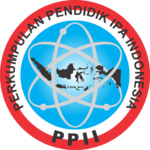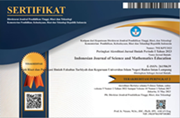Analysis of Students’ Problem Solving Ability Based on Metacognition Ability in Set Topic
Abstract
This mixed method research was conducted to find out how students' problem-solving abilities were seen from the metacognition ability on the topic set. The population in this study were class XII students of MAN 2 Jambi City in the 2020/2021 academic year. The sample in this study was selected using the simple random sampling technique. The results of this study indicate that students' problem solving abilities based on students' metacognitive abilities on the topic of the set are in the good category. Metacognition ability can make it easier for students to solve mathematical problems that have been given. Metacognition indicators that seem to have been mastered by students in this study are awareness, regulation, and evaluation.
Keywords
Full Text:
PDFReferences
D. Rahmawati, S. Sajidan, dan A. Ashadi, “Analysis of problem solving skill in learning biology at senior high school of Surakarta,” Journal of Physics: Conference Series, vol. 1006, no. 1, 2018, doi: 10.1088/1742-6596/1006/1/012014.
R. Rustanuarsi, A. Mirza, dan Hamdani, “Proses pemecahan masalah dalam materi aritmatika sosial berdasarkan metakognisi siswa smp,” hal. 1–12, 2015.
A. Yarmayani, “Analisis Kemampuan Pemecahan Masalah Matematis Siswa Kelas Xi Mipa Sma Negeri 1 Kota Jambi,” Jurnal Ilmiah Dikdaya, vol. 6, no. 2, hal. 12–19, 2016.
U. Sholihah, “Membangun metakognisi siswa dalam memecahkan masalah matematika,” vol. 04, no. 46, hal. 83–100, 2016.
Wahyuddin, “Pengaruh Metakognisi, Motivasi Belajar, dan Kreativitas belajar terhadap Kemampuan Pemecahan Masalah Siswa Kelas VIII SMP Negeri 2 Sabbangparu Kabupaten Wajo,” Jurnal Daya Matematis, vol. 4, no. 1, hal. 72–83, 2016.
S. K. Jua, Sarwanto, dan Sukarmin, “The profile of students’ problem-solving skill in physics across interest program in the secondary school,” Journal of Physics: Conference Series, vol. 1022, no. 1, 2018, doi: 10.1088/1742-6596/1022/1/012027.
A. Mustamin, “Pelibatan Metakognisi Dalam Pemecahan Masalah Matematika,” Edumatica, vol. 01, no. April, hal. 25–32, 2011.
B. Mustofa, “Implementasi Pembelajaran Kontruktivistik dalam Membentuk Siswa yang Ulul Albab di Madrasah Aliyah Negeri 2 Tulungagung,” IAIN Tulungagung, 2016.
R. Khairunnisa dan N. Setyaningsih, “Analisis Metakognisi Siswa dalam Pemecahan Masalah Aritmatika Sosial Ditinjau dari Perbedaan Gender,” no. Knpmp Ii, hal. 465–474, 2017.
V. R. Bulu, Budiyono, dan S. Isnandar, “Peluang Ditinjau dari Tipe Kepribadian Tipologi Hippocrates – Galenus Kelas XI MIA 1 SMA Negeri I,” Jurnal Elektronik Pembelajaran Matematika, vol. 3, no. 9, hal. 970–984, 2015.
A. Yimer dan F. N. Ellerton, “Cognitive and Metacognitive Aspects of Mathematical Problem Solving : An Emerging Model,” no. 1994, hal. 575–582, 2001.
T. Thayeb dan A. P. Putri, “Kemampuan Metakognisi Untuk Meningkatkan Keterampilan Pemecahan Masalah Matematika Siswa Kelas Viii B Mts Madani Alauddin Paopao Kabupaten Gowa,” Jurnal Matematika dan Pembelajaran, vol. 5, no. 1, hal. 1–17, 2017, doi: 10.24252/mapan.2017v5n1a1.
D. Purnomo, T. Nusantara, dan S. Rahardjo, “Kata Kunci: metakognisi, diskusi kelompok, pembelajaran matematika,” no. 1988, 2014.
Kamid, “Metakognisi Siswa Dalam Menyelesaikan Soal Matematika (Studi Kasus Pada Siswa SMP Berdasarkan Gender),” vol. 03, no. April, hal. 64–72, 2013.
A. S. Pratama, “Analisis Pemecahan Masalah Berbasis Metakognitif,” 2019.
S. Siyutko dan A. Sodik, Dasar Metodologi Penelitian, vol. 11, no. 3. Yogyakarta: Literasi Media, 2015.
H. Tan, “Kemampuan Pemecahan Masalah Matematika,” no. May, 2019.
R. Ananda dan M. Fadhil, Statistik Pendidikan: Teori dan Praktik dalam Pendidikan’, Cetakan Pe. Medan: CV. Widya Puspita, 2018.
Suryana, “Metodologi Penelitian Model Prakatis Penelitian Kuantitatif dan Kualitatif,” Universitas Pendidikan Indonesia, hal. 1–243, 2012, doi: 10.1007/s13398-014-0173-7.2.
Hardani dkk., Metode Penelitian Kualitatif & Kuantitatif, no. April. Pustaka Ilmu Group, 2020.
J. Ibrahim, “The Effect of Cooperative Learning with Metacognitive Scaffolding on Mathematics Conceptual Understanding and Procedural Fluency,” Journal International, no. 32, 2012.
M. T. Magiera dan S. J. Zawojewski, “Characterizations of Social-Based and Self-Based Contexts Associated With Students ’ Awareness , Evaluation , and Regulation of Their Thinking During Small-Group Mathematical Modeling,” Journal on Mathematics Education, vol. 42, no. 5, hal. 486–520, 2015.
DOI: http://dx.doi.org/10.24042/ijsme.v4i2.8668
Refbacks
- There are currently no refbacks.
Copyright (c) 2021 Unit Riset dan Publikasi Ilmiah FTK UIN Raden Intan Lampung

This work is licensed under a Creative Commons Attribution-ShareAlike 4.0 International License.

Indonesian Journal of Science and Mathematics Education is licensed under a Creative Commons Attribution-ShareAlike 4.0 International License.




